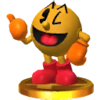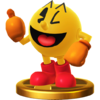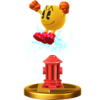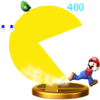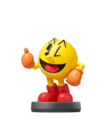Pac-Man (SSB4)
| Pac-Man in Super Smash Bros. 4 | |
|---|---|
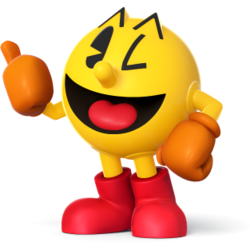 
| |
| Universe | Pac-Man |
| Other playable appearance | in Ultimate |
| Availability | Starter |
| Final Smash | Super Pac-Man |
| Tier | F (45) |
| “ | PAC-MAN Hungers for Battle! | ” |
| —Introduction Tagline | ||
Pac-Man (パックマン, Pakkuman), stylized in-game as PAC-MAN, is a newcomer in Super Smash Bros. 4. He was revealed on June 10th, 2014 during the E3 2014 Super Smash Bros. roundtable, alongside the Mii Fighters.[1][2] Pac-Man is one of six third-party characters in SSB4, alongside Capcom's Mega Man and Ryu, Sega's Sonic and Bayonetta, and Square Enix's Cloud.
Although Pac-Man has been voiced by numerous actors in the past, Pac-Man has no voice actor in this game, and instead uses modified and recycled sounds from several Bandai Namco arcade games such as the 1980 Pac-Man game and Pac-Land.
Pac-Man's moveset involves signature aspects of his home series, such as utilizing fruits and eating Power Pellets,[3] while also referencing numerous other Namco games in a few ways, most notably via his up taunt. While Pac-Man retains his classic "wedge" form, he only uses it occasionally, such as for his down tilt and his side taunt. Instead, he mostly uses his "ball" form that appeared on game cabinet artwork and advertising before it debuted in-game in the Japanese version of Pac-Land.
Pac-Man is ranked 45th out of 55 on the tier list, placing him at the top of the F tier. Pac-Man's strengths lie in his unique item-oriented playstyle, which involves a capable camping and projectile game via the use of Bonus Fruit for a range of items, along with Pac-Jump and Fire Hydrant for stage control. These traits synchronize well with Pac-Man's regular moves, the overwhelming majority of which allow him to rack up damage effectively because of their low start-up lag and low base knockback. Pac-Man also boasts a great recovery thanks to Power Pellet and Pac-Jump covering great distances, both of which are further supplemented by his ability to wall jump.
However, Pac-Man suffers from numerous flaws, which include mediocre mobility and average range. The aforementioned low base knockback of his moveset also significantly hinders his ability to KO effectively, which is further compounded by his strongest attacks having high overall lag. Finally, his most notable flaws include what is considered the most ineffective grab game among the cast, along with all his special moves being exploitable either via reflection, direct usage by his opponents, or even gimping his recovery. This, in turn, gives Pac-Man particularly disadvantageous matchups against characters with projectile-nullifying abilities like Fox, Mario, but most notoriously, Villager and Rosalina & Luma.
Overall, Pac-Man excels at mindgames and damage racking, although he has a high learning curve because of his items requiring constant micromanagement. Pac-Man's weaknesses and learning curve have resulted in him being considered non-viable in the current metagame, as well as overall attaining a small playerbase throughout SSB4's lifespan, but he has nevertheless achieved a decent amount of success, such as Abadango in the early metagame, Tea towards the end of the game's competitive lifespan, and Sinji throughout the game's competitive lifespan.
Attributes[edit]
Pac-Man is a middleweight whose attributes slightly deviate from the typicality of his weight class. Although his air speed is average and his air acceleration is above average, his walking and dashing speeds are slightly below average, while his falling speed, gravity, and traction are below average. As a result, these traits make him a rather floaty character, albeit not to the degree of Luigi. Pac-Man is also able to crawl and wall jump, although the former is largely impractical because of his crouch's tall height.
Pac-Man, like Diddy Kong, is reliant on his item-producing special moves to control the flow of battle and win in the neutral game. Two special moves, Bonus Fruit and Fire Hydrant, grant him numerous mix-ups for almost any situation: each object provided by Bonus Fruit has different attributes, which makes them good spacing, combo, and edge-guarding options, and some notably possess early KO potential as a way to overcome his smash attacks' slow speeds and low ranges, such as the Apple or the Key. This allows him to confuse and force movements from his opponents to put them in disadvantageous positions, especially off-stage. With extreme technical skill, Bonus Fruit can even be used for footstool jump-initiated zero-to-death combos, making Pac-Man one of the few characters with this ability in no-item scenarios.
Fire Hydrant, when used in the air, functions similarly to Stone, which makes it useful for covering landings or breaking combos. It is also Pac-Man's most powerful projectile when launched, which makes it a viable KO option from a distance. In addition to its offensive potential, Fire Hydrant has defensive potential, thanks to its shots of water possessing a push effect. As a result, the water can be used to space, gimp poor recoveries, and even force opponents into Pac-Man's attacks. Apart from his projectiles, Pac-Man also possesses a slow, but potent, KO option in Power Pellet, which functions both as a great recovery and mindgame option, as it can be aimed prematurely and made to curve in creative angles using his Fire Hydrant's push effect, and can also be confirmed off of Bonus Fruit's Bell. Pac-Jump is an effective vertical recovery should all three trampoline jumps be used, and makes it safe to edge-guard off-stage, as Pac-Man will likely make it back onto the stage. It is also difficult to gimp, especially from an overhead perspective, thanks to Pac-Man's jumps having unblockable hitboxes, and can function as a great out of shield option when used properly.
Outside of his specials, Pac-Man has a good combo game. Though his ground attacks are weak with slight ending lag, his neutral attack and tilts are fast and extend his hitboxes (forward tilt) or slide him forward (down tilt), letting him attack out of shield easily or poke opponents at a safe distance. His up tilt can chain into itself at low percentages and up aerials, while his down tilt can reliably combo into his dash attack. The latter hits multiple times with nearly no ending lag and allows Pac-Man to follow up with almost any ground move, such as his safe and fast neutral attack. Pac-Man is also capable in the air; his aerials are fast and can chain into themselves, especially his forward and up aerials, his neutral aerial is a useful out of shield option and both it and his back aerial are effective off-stage finishers, making him overall good at damage racking and edge-guarding.
However, Pac-Man has many exploitable flaws. One of his biggest issues is his inability to KO early because of the overwhelming majority of his moveset having low base knockback. Although his tilts and aerials are fast, only his clean neutral aerial and clean back aerial possess actual KO potential. This, in turn, is further compounded by their reliability being most apparent at high percentages and/or while near the left or right blast lines. His main KO options, his smash attacks, can KO near the edge easily thanks to their respectable damage outputs and knockback growth, but are very punishable and predictable because of their considerable amounts of start-up and ending lag. Pac-Man also has viable KOing options in Bonus Fruit's key and flying Fire Hydrant, but former needs to be charged for 2.37 seconds (specifically 142 frames) in order to be accessible, whereas the latter can be easily used against Pac-Man just as he is about to launch it. Additionally, Pac-Man's average range and awkward hitboxes can make landing hits or spacing difficult against opponents with high reach, while his below-average movement speed can make it difficult to both chase down opponents or create space and charge his Bonus Fruits, especially against rushdown-oriented characters.
Another prominent issue is his grab game: his grabs carry extremely high risk due to their extreme lag and notoriously awkward hitboxes, with only the starting animation having three separate grab hitboxes that last for very short times. This makes it far riskier to use his grab for punishes compared to other characters. This is further burdened by his unimpressive throws, with only his down throw having combo potential, most notably into Bonus Fruit's key, Power Pellet, a dash attack, or a short hopped forward aerial into neutral aerial. Although the latter combo does not work on characters whose hurtboxes are low after missing a tech, it can still be beneficial, as Pac-Man can instead lock the opponent with a short hopped forward aerial at low to medium percentages.
Despite their perks, all of Pac-Man's special moves can be used against him. Bonus Fruit's objects are items that can only exist once at a time, hence opponents can grab them out of the air, nullifying one of Pac-Man's only projectiles so long as they hold onto it. So long as Bonus Fruit is nullified, Pac-Man is disadvantaged at spacing, KOing and mindgames, while a competent opponent can use his own Bonus Fruit against him. This significantly hinders Pac-Man's matchups against characters who are able to reflect projectiles, with two particularly notable examples: Villager can Pocket Bonus Fruit for long periods and thus strongly hinder his offense, whereas Rosalina & Luma can use Gravitational Pull to completely nullify both of his projectiles and render him absolutely helpless at zoning.
His Fire Hydrant can be turned against him as well; it can be knocked back or reflected by opponents, even in the first few frames when it is released, making it possible for Pac-Man to immediately be dealt noticeable damage. Its push effect also affects him, and can cost Pac-Man a stock if he is careless. Despite being strong, Power Pellet is highly predictable and can be interrupted by any attack, which drops a healing Power Pellet that can be used by the opponent, and his Pac-Jump, though giving great vertical height, can also be used by opponents for gimping Pac-Man's own recovery. Due to these possibilities, a good Pac-Man player must keep watch of where his items are in order to inflict the highest knockback possible at a safer range, and avoid his items' abilities being turned against him.
Pac-Man benefits from his custom moves. Freaky Fruit deals less damage, but each fruit and object has its own erratic pattern and thus can provide even greater mix-ups. Lazy Fruit is slower and deals less damage, but the fruits and objects take longer to disappear, which enables them to be usable more than once and provide different mix-ups. Distant Power Pellet is much more maneuverable which allows Pac-Man to mix up his recovery more easily at the cost of less damage and knockback. Enticing Power Pellet travels less distance but produces a windbox which can be used to gimp recovering opponents and is much more powerful. Power Pac-Jump functions like a traditional recovery move in that it only provides one jump, but it immediately launches Pac-Man very high and enables him to hit multiple times while ascending, making it suitable for offensive playstyles. Meteor Trampoline decreases in height after each jump, but the fourth jump can bury grounded opponents and, true to its name, meteor smash airborne ones, as its name implies. On-Fire Hydrant does not shoot out as far, but it shoots fireballs instead of water, shoots three times instead of twice, takes less damage to launch, and the hydrant itself deals more damage. Finally Dire Hydrant explodes when it touches a surface, opponent, or after a set distance which makes it less risky to use since opponents cannot launch the hydrant, the explosion improves the move's horizontal range, and because Pac-Man jumps higher when he deploys the hydrant it can be used to dodge projectiles.
Overall, while Pac-Man excels at mindgames and damage racking, his moveset's overall low base knockback and poor range makes it difficult for him to KO opponents. As a result, he is dependent on utilizing traps and zoning in order to continually deal damage and set up a KO, such as collectively using his air game, Bonus Fruit, and varied recovery to edge-guard. While Pac-Man's special moves grant him a uniquely versatile moveset, they can also hinder him in battle, as one careless move can decide the momentum of not only himself, but even the entire match.
Update history[edit]
Pac-Man has received a mix of buffs and nerfs in game updates. Update 1.0.4 increased the ending lag to his up smash and lowered the damage output of Bonus Fruit's Galaxian. Fire Hydrant and Power Pellet had their durability and healing output slightly increased respectively, necessitating players using them even more wisely than before, lest the opponent capitalizes on using their effects to their own advantage. The changes to shield mechanics brought about by 1.1.0 and 1.1.1 enable Pac-Man to utilize some new options for pressuring shields through combinations of back aerial, Bonus Fruit's key, and Fire Hydrant. Lastly, update 1.1.5 marginally increased the knockback of his smash attacks and back aerial, which slightly improved his KO potential.
 The pause menu glitch where Pac-Man would continuously move in a distorted direction has been fixed.
The pause menu glitch where Pac-Man would continuously move in a distorted direction has been fixed.
 Up smash's ending lag increased: frame 38 → 50.
Up smash's ending lag increased: frame 38 → 50. Bonus Fruit's Galaxian deals less damage: 11% → 9%.
Bonus Fruit's Galaxian deals less damage: 11% → 9%. Power Pellet heals more damage: 1% → 2%.
Power Pellet heals more damage: 1% → 2%. Fire Hydrant takes more damage to be launched: 12% → 13%.
Fire Hydrant takes more damage to be launched: 12% → 13%.
 Up and down angled forward tilt have more startup lag (frame 4 → 5), now matching the non angled version.
Up and down angled forward tilt have more startup lag (frame 4 → 5), now matching the non angled version. Pac-Jump can no longer be Pocketed.
Pac-Jump can no longer be Pocketed.
 Fixed a glitch where Pac-Jump could send opponents through the stage.
Fixed a glitch where Pac-Jump could send opponents through the stage. The formerly removed glitch where Pac-Man could send Fire Hydrant through stages has returned. This is the first known case of a removed glitch returning to the game.
The formerly removed glitch where Pac-Man could send Fire Hydrant through stages has returned. This is the first known case of a removed glitch returning to the game.
 Fixed reintroduced glitch where Pac-Man could send Fire Hydrant through stages.
Fixed reintroduced glitch where Pac-Man could send Fire Hydrant through stages.
 Forward smash has more knockback scaling (97 (clean)/100 (late) → 99/102).
Forward smash has more knockback scaling (97 (clean)/100 (late) → 99/102). Up smash's second hit has more knockback scaling (95 (clean)/90 (late) → 97/92).
Up smash's second hit has more knockback scaling (95 (clean)/90 (late) → 97/92). Down smash has more knockback scaling (84 (clean)/90 (late) → 86/92).
Down smash has more knockback scaling (84 (clean)/90 (late) → 86/92). Back aerial's clean hit has more knockback scaling (98 → 100).
Back aerial's clean hit has more knockback scaling (98 → 100).
Moveset[edit]
- Pac-Man can crawl and wall jump. However, Pac-Man's crawl is largely impractical because of his crouch's tall height.
For a gallery of Pac-Man's hitboxes, see here.
| Name | Damage | Description | ||
|---|---|---|---|---|
| Neutral attack | 3% | A one-two combo followed by a bicycle kick. It has decent range for a neutral attack and thanks to its very minimal start-up lag, it is useful as an anti-pressure option as a follow-up from his dash attack. | ||
| 2% | ||||
| 4% | ||||
| Forward tilt | 8% | A side kick. It can be angled, with its downward angle being capable of jab resetting at low percentages. It is also useful for spacing beginning at 45%. | ||
| Up tilt | 7% | An upward headbutt. It can combo into itself from 0% to low percentages, into back aerial at low percentages, and into neutral and up aerials from low to medium percentages. It also renders Pac-Man's head intangible throughout its hitbox's duration. However, its hitbox is somewhat misleading because of it following the trail emitted by its animation, meaning it is possible to miss a small or crouching character. | ||
| Down tilt | 6% | Transforms into his wedge form and chomps at a downward diagonal angle. It has deceptive range, thanks to Pac-Man chomping forward before retreating, which makes it useful for spacing. Using it repeatedly also allows Pac-Man to pseudo-crawl. However, its hitbox has a very short duration. | ||
| Dash attack | 2% (hits 1-2), 5% (hit 3) | Transforms into his wedge form and chomps thrice while sliding forward. It has a windbox that hits on frame 3, which makes it the second fastest dash attack in the game, being surpassed only by Little Mac's. When coupled with its very minimal ending lag, it can easily combo into his forward, up, and neutral aerials, or used as a cross-up to escape pressure. | ||
| Forward smash | 16% (clean ghost), 15% (clean arm), 9% (late) | Thrusts Blinky forward to slam into the opponent. It is Pac-Man's strongest smash attack, as its clean hit KOs middleweights at 109% while near the edge, and has disjointed range. However, it has very high start-up and ending lag, as well as a late hitbox (active right before Blinky disappears) which is significantly weaker. | ||
| Up smash | 3% (hit 1), 14% (hit 2 clean), 8% (hit 2 late) | Thrusts Inky upward to slam into the opponent. It has a weak initial hitbox that launches the opponent into a stronger second hitbox, the latter of which KOs middleweights at 129% when clean. It also has the lowest amount of start-up lag out of Pac-Man's smash attacks, as well as disjointed range. However, it has noticeable start-up and ending lag, as well as a significantly weaker late hitbox. Despite having disjointed vertical range, it has poor horizontal range, to the point that it requires Pac-Man himself to almost touch a grounded opponent. | ||
| Down smash | 13% (clean), 7% (late) | Thrusts Pinky and Clyde on each side to slam into the opponent. It has disjointed range and can punish rolls, while its clean hitboxes are semi-spikes that are strong enough to KO middleweights at 135% while near the edge. However, it has the lowest damage output out of his smash attacks, very high start-up and ending lag, and significantly weaker late hitboxes. | ||
| Neutral aerial | 10% (clean), 6% (mid), 3% (late) | Transforms into his wedge form and backflips repeatedly. It has sex kick properties and thanks to it hitting on frame 3, it is his fastest aerial attack, and one of the fastest aerials of any kind in the game. It also has the lowest amount of landing lag out of his aerials. In addition to being a very useful combo breaker, its clean hitbox's respectable damage output and very high knockback growth enable it to function as a KO option, as it KOs middleweights at 128% while near the left/right blast lines. | ||
| Forward aerial | 5.3% | A roundhouse kick. It has very minimal start-up and ending lag. When coupled with its almost nonexistent base knockback, it is useful for damage racking and can lock at low percentages, although the latter requires Pac-Mac to use it just before landing or with the aid of platforms. Easily combos into itself, and can lead into a neutral aerial as a KO or gimping option offstage. Thanks to Pac-Man's above average air acceleration, this move is also a useful spacing option, as he can retreat while using it. However, it is unsuitable for approaching because of its very low power and minimal range. | ||
| Back aerial | 11.8% (clean), 7% (late) | A dropkick. It is Pac-Man's most damaging aerial, as its clean hitbox KOs middleweights at 124% while near the left/right blast lines. Despite its power, it is quite fast, as it hits on frame 9. It also has sex kick properties like his neutral aerial. However, it has the highest amount of landing lag out of his aerials. | ||
| Up aerial | 10% | A bicycle kick. Its long range and almost nonexistent base knockback make it a reliable juggling option and a decent anti-air attack. Lasts longer than one expects while having consistent damage throughout, allowing the late hitbox to connect against opponents or Fire Hydrant for unique followups. Also causes Pac-Man to float slightly, allowing it to connect even if the move is initiated right before landing. Like up tilt, its hitbox is somewhat misleading because of it following the trail emitted by its animation, which can cause it to miss even if Pac-Man's leg touches an opponent. It is seemingly based on his Flip Kick from Pac-Man World 2. | ||
| Down aerial | 1.5% (hits 1-3), 6% (hit 4) | A series of stomps, similar to Lucas' down aerial. Although it has minimal start-up lag, it is Pac-Man's overall least useful aerial attack, due to its initial hits not keeping the opponent properly trapped, while it only deals average knockback and has the second highest amount of landing lag out of his aerials. As with up aerial, it causes Pac-Man to float slightly, although the effect is much more subtle. | ||
| Grab | — | Emits Boss Galaga's tractor beam from his hand. While it has above average range, it consists of a series of three hitboxes with short delays in between with no grabboxes when the beam extends fully and retreats. This, along with its significant start-up and ending lag, makes it notoriously punishable and often considered the worst grab in the game. | ||
| Pummel | 3.25% | A headbutt. Moderately slow, but tied with Mario's pummel as the second most damaging pummel in the game. | ||
| Forward throw | 6% | Shoves the opponent forward. Due to its low damage output, very low base knockback and below average knockback growth, it is one of the weakest throws of any kind in the game. However, it can potentially act as a set-up into Bonus Fruit. | ||
| Back throw | 11% | Spins twice and then tosses the opponent backward. It is Pac-Man's most damaging throw and his only throw with KO potential. However, it does not KO middleweights until 170% while near the edge because of its below average knockback growth. Additionally, its deceptively high ending lag prevents reliable followups, and the throw's spins don't possess any damaging hitboxes, unlike other similar back throws (such as Mario's), | ||
| Up throw | 5% | Tosses the opponent straight upward. If Pac-Man is pushed upwards by the Fire Hydrant's water it can combo into an up aerial, but otherwise it lacks combo potential and is not very damaging. It can still be used as a kill throw starting at about 200%. | ||
| Down throw | 1.5% (hits 1-3), 6% (throw) | Pins the opponent to the ground and transforms into his wedge form to chomp them. It has decent combo potential, most notably into Bonus Fruit's key at 0% and up to medium percentages, although it can also combo into his dash attack or Power Pellet at low percentages. At low to medium percentages, if the opponent fails to tech the down throw, Pac-Man can also lock them with a short hopped forward aerial and thus perform another set-up. If Pac-Man is being pushed by the Fire Hydrant's water it can true combo into a forward or neutral aerial, though this can be hard to pull off. | ||
| Forward roll Back roll Spot dodge Air dodge |
— | — | ||
| Techs | — | — | ||
| Floor attack (front) Floor getups (front) |
7% | Kicks around himself while getting up. | ||
| Floor attack (back) Floor getups (back) |
7% | Kicks around himself while getting up. | ||
| Floor attack (trip) Floor getups (trip) |
5% | Performs a side kick to the left and then to the right while getting up. | ||
| Edge attack Edge getups |
7% | Performs a legsweep while climbing up. | ||
| Neutral special | Default | Bonus Fruit | 4% (cherry), 6% (strawberry), 8% (orange), 9% (apple), 12% (melon), 9% (Galaxian), 8% (bell), 15% (key) | Holds out his hand and cycles through the collectable fruit and items in the Pac-Man series. Each fruit and object has distinct properties, and is associated with a distinct level of charge. It takes 2.37 seconds (specifically 142 frames) to fully charge, and Pac-Man can either throw the charged fruit/object if the special button is pressed once, or continue charging if the button is held down. If charging is interrupted, holding down the special button will make Pac-Man resume charging from the most recent charge. It can be charge canceled and, while charging in midair, Pac-Man's gravity will be decreased. The thrown projectile functions as an item, which can be grabbed by Pac-Man or opponents with good timing. Opponents can hit Pac-Man to forcibly drop his fruit, either while he's charging or holding his fruit; the latter can also be done to opponents by hitting those who are holding a fruit. Pac-Man can only create one fruit/object at a time, and cannot create another if it is being held by an opponent. Due to its fast speed and high power, Bonus Fruit's key is one of Pac-Man's most viable KO options, as it KOs middleweights at 140% while near the edge. Outside of this, Bonus Fruit can be used for intricate zero-to-death combos that are initiated by repeatedly using jab resets and footstool jumps on an opponent while dropping any of its fruits/objects. Can aid Pac-Man's already impressive recovery if immediately thrown. |
| Custom 1 | Freaky Fruit | 2% (cherry), 4% (strawberry), 2% (orange), 9% (apple), 13% (melon), 7% (Galaxian), 6% (bell), 10% (key) | Each fruit/object deals less damage, but has more erratic behavior, such as the key instantly disappearing but meteor smashing aerial opponents instead of launching them. Also takes much longer to cycle past the orange, and fruits disappear upon hitting any hitbox, with the exception of the Galaxian and Bell. The visual effect surrounding the fruit/object during the cycle is orange instead of yellow. | |
| Custom 2 | Lazy Fruit | 2% (cherry), 5% (strawberry), 8% (orange), 9% (apple), 12% (melon), 3% (Galaxian), 8%/10% (bell), 10% (key) | Each fruit/object moves much slower and deals less damage, but takes longer to disappear. It also takes longer to cycle past the orange. The visual effect surrounding the fruit/object during the cycle is green instead of yellow. | |
| Side special | Default | Power Pellet | 10% (start-up), 4% (dash), 12% (ending), 17% (combined hit) | Extends a trail of Pac-Dots that ends with a Power Pellet, and then transforms into his wedge form before propelling himself to eat them. The trail can be extended to a maximum of six Pac-Dots, while the dash has a controllable trajectory that can allow for mindgames and even recovery. It also grants super armor after Pac-Man eats the Power Pellet, and upon extending a full trail, its last hit will be strong enough to KO middleweights at 119% while near the edge. Pac-Man is able to fast fall immediately during the move's ending lag, and will not go off ledges during a grounded chomp if the trail does not go past a ledge. Interrupting it during its start-up drops the Power Pellet, which heals 2% and can be eaten by any character. Pac-Man can act out after the move and is able to automatically ledge-snap throughout its duration, but if he bumps directly into a surface during the chomps, it stops and he suffers from a lengthy tumbling animation that can cause him to self-destruct or be punished. |
| Custom 1 | Distant Power Pellet | 10% (start-up), 1% (initial dash), 2% (dash), 6% (ending) | The trail deploys faster, consists of eight Pac-Dots, and grants significantly improved maneuverability. However, it is overall weaker. | |
| Custom 2 | Enticing Power Pellet | 4% (dash), 15% (ending, full charge) | The last hit is much stronger and the Power Pellet pulls opponents towards it, but the trail takes much longer to deploy and consists of two Pac-Dots. | |
| Up special | Default | Pac-Jump | 7% (clean), 6% (mid), 5% (late) | Transforms into his wedge form and produces a trampoline to bounce off of. Extremely fast, coming out at frame 4. Subsequent bounces grant more height, but the fourth bounce breaks the trampoline and renders the attempted user helpless. Pac-Man himself can hit opponents while ascending, and since the trampoline instantly forcing opponents to jump once touched, it is an effective grounded combo breaker. When used on-stage, the trampoline can be used for mindgames and set-ups. In team battles, it is notable for being potentially game breaking, as two Pac-Men could infinitely bounce off each others trampolines past the upper blast line, similarly to the Luigi Ladder. The trampoline originates from Mappy. |
| Custom 1 | Power Pac-Jump | 1.5% (loop), 3% (last) | Functions like a traditional recovery, as it launches higher than the first jump of Pac-Jump and allows Pac-Man to hit multiple times while ascending, but the trampoline vanishes instantly. | |
| Custom 2 | Meteor Trampoline | 3% (jump), 4%/5% (meteor) | Subsequent jumps are lower instead of higher, while the fourth jump will bury grounded users and meteor smash aerial ones. There is a weak meteor smash hitbox below the trampoline on start-up. However, it overall deals less damage. | |
| Down special | Default | Fire Hydrant | 9% (drop), 13% (flying), 10% (tumbling), — (water) | Drops a fire hydrant below himself that shoots water. When it receives enough damage (13%), it is launched as a powerful projectile that travels in the trajectory of the move that launched it. The launched hydrant can be used to hit opponents, or potentially Pac-Man himself if it is sent flying by an opponent. While flying, it is powerful enough to KO middleweights at 147% while near the edge. If placed on a steep enough slope, it will tumble down the slope until it disappears. The water does not deal damage, but has a push effect that can allow for mindgames, mix-ups, and even gimps. Due to it functioning as a constantly active hitbox, the hydrant can actually be counterattacked and Pocketed while it is stationary. |
| Custom 1 | On-Fire Hydrant | 6% (drop), 15% (flying), 4%/5%/6% (tumbling), 6%/4% (fireballs) | The fire hydrant shoots fireballs instead of water, which can harm opponents and Pac-Man himself. The flames do not fly out as far, but are shot three times instead of twice. The hydrant itself deals more damage, but has less knockback, and requires less damage to be launched compared to Fire Hydrant. | |
| Custom 2 | Dire Hydrant | 9% (drop) | The fire hydrant explodes on impact with an opponent, surface, or after a set distance. The explosion does not harm Pac-Man, but it has low knockback and lacks Fire Hydrant's versatility. Pac-Man jumps higher compared to the other down specials when he drops the fire hydrant, which gives him a way to dodge projectiles if timed right. | |
| Final Smash | Super Pac-Man | 15% (per hit) | Simultaneously eats a Power Pellet and a Super Pellet, transforming into a noticeably enlarged version of his 2D wedge form. Upon transforming, Pac-Man can move in the four directions and attempt to chomp his opponents, which deals damage and moderate knockback. Victims aesthetically turn into ghost eyes until hitstun ends. It is also unique in that, unlike other mobile Final Smashes, it allows Pac-Man to wrap around the screen if he moves off-screen, making it very effective at edge-guarding. | |
Stats[edit]
| Stats | Weight | Dash speed | Walk speed | Traction | Air friction | Air speed | Air acceleration | Gravity | Falling speed | Jumpsquat | Jump Height | Double jump Height |
|---|---|---|---|---|---|---|---|---|---|---|---|---|
| Value | 95 | 1.6 – Initial dash 1.52 – Run |
1.045 | 0.045 | 0.015 | 1.04 | 0.01 – Base 0.07 – Additional |
0.072 | 1.35 – Base 2.16 – Fast-fall |
5 | 34.099998 - Base 16.477137 - Short hop |
34.099998 |
Announcer call[edit]
English/Japanese/Chinese
On-screen appearance[edit]
- Opens his mouth while in his 2D wedge form, then transforms into his ball form.
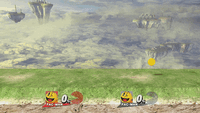
|
|---|
Taunts[edit]
- Up taunt: Performs the "Namco Roulette", which produces sprites of classic Namco items, characters and enemies, similarly to Bonus Fruit. It is the only taunt in the game with variable visual and sound effects.
- Side taunt: Transforms into his wedge form and chomps to the right and left at varying intervals while emitting his iconic chomping sound.
- Down taunt: Lays down while Blinky, Pinky, and music notes hover over him while an arrangement of the first five notes of the intermission theme from Pac-Man plays.
| Up taunt | Side taunt | Down taunt |
|---|---|---|
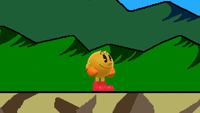
|
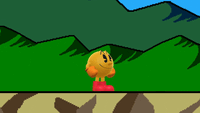
|
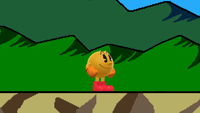
|
Idle poses[edit]
- Scratches his head.
- Looks at the screen and winks while giving a thumbs up, similarly to his pose in his official art.
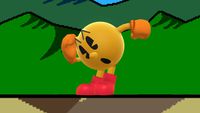 |
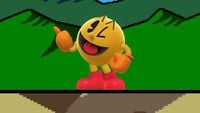
|
|---|
Crowd cheer[edit]
| English | Japanese | |
|---|---|---|
| Cheer | ||
| Description | Pac-Man! | Go! Go! Pac-Man! |
| Pitch | Group chant | Group chant |
Victory poses[edit]
- Chases a vulnerable ghost in his wedge form, then shifts to his ball form and poses akimbo.
- Appears on screen in his wedge form, trips onto the floor and transforms into his ball form, before raising his fist up while sitting down clumsily.
- Drops from the sky in his ball form and lands while a sign displaying 7650 pops up from the ground, before striking a winking, thumbs up pose. This is based on Pac-Land, with "765" being Japanese wordplay on "Namco".
 |
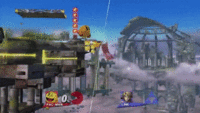 |
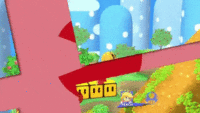
|
|---|
In competitive play[edit]
Official Custom Moveset Project[edit]
| Character | Custom sets available | ||||
|---|---|---|---|---|---|
| 1132 | 1131 | 1122 | 1121 | 2132 | |
| 2131 | 2122 | 3131 | 3132 | 3121 | |
Most historically significant players[edit]
See also: Category:Pac-Man players (SSB4)
Abadango - The best Pac-Man player in the world in the early metagame, placing highly at major such as 4th at EVO 2015 and 17th at Umebura F.A.T. He has since dropped Pac-Man for other characters.
Ginko - One of the best Pac-Man players in Japan, co-maining Pac-Man alongside Mewtwo and notably placing 13th at Umebura F.A.T. and 33rd at both Umebura S.A.T. and Umebura Japan Major 2017.
Sinji - The best Pac-Man player of all-time and the only solo Pac-Man player ranked on the PGR 100, where he was ranked 85th. He regularly placed between 17th and 33rd at majors between 2017 and 2018.
Tea - One of the best Pac-Man players in 2018 who gained more recognition at a national level after placing 2nd at SoCal Regionals 2018 defeating Raito and falln as well as 3rd at Umebura Smash 4 Final, the latter being the highest placement for a Pac-Man player at a major.
Tier placement and history[edit]
When SSB4 was initially released, Pac-Man was perceived positively due to Fire Hydrant allowing for stage control, Bonus Fruit being useful for spacing and mix-ups, and both Power Pellet and Pac-Jump granting him a long-distanced recovery. When these traits were coupled with the revelation of Pac-Man's advanced footstool set-ups, many thought that he could be a very viable character when mastered, thanks to players such as Abadango, Ginko, and Tea showcasing these strengths in competitive play during the early metagame.
However, Pac-Man's flaws would quickly become more apparent and, in a turn for the worse, more significant than most would think. Many found out that Pac-Man had a significantly high learning curve, below average damage output compared to most of the cast, and that his special moves were double-edged swords due to being susceptible to being used against him. He also had lackluster fundamental advantages as well, such as his laggy smash attacks, unimpressive KO potential due to his moveset's overall low base knockback, and abysmal grab game. Lastly, his reliance on projectiles gives him infamously difficult matchups against characters that are capable of negating them, such as Rosalina & Luma and Villager, both of whom are common at high-level play. Altogether, these aspects would lead many to believe that Pac-Man was not as viable as originally thought, and would culminate with him being ranked 29th on the first 4BR tier list.
Following the release of the first tier list, Pac-Man's tournament results sharply declined due to a less consistent playerbase and Abadango's switch to more viable characters. This further hurt Pac-Man's viability, leading to a drop to 38th on the second tier list, then to 45th on the third tier list. These drops also solidified him as a low-tier character that was unviable in the metagame, with some believing Pac-Man was potentially one of the worst characters in the game.
Countering that perception, however, were solid results from dedicated mains. Sinji notably became a consistent threat at majors in 2017, which prevented Pac-Man from dropping further, and he remained at 45th place on the fourth and final tier list. In addition, 2018 saw Tea attend more events, resulting in strong results such as 2nd at SoCal Regionals 2018 and 3rd at Umebura Smash 4 Final. Due to these positive developments, several players began arguing that Pac-Man was better than previously perceived, although with the end of the game's competitive lifespan in 2018, Pac-Man's true viability remains a mystery.
In Solo Modes[edit]
All-Star Mode[edit]
In All-Star Mode, Pac-Man is fought in Stage 1 in the 3DS version or Stage 7 in the Wii U version alongside Mario, Donkey Kong, Luigi, Mr. Game & Watch, and Little Mac.
 Event Matches[edit]
Event Matches[edit]
Solo Events[edit]
- New Challengers 2: Pac-Man is one of the seven opponents fought in this event alongside Greninja, Palutena, Robin, Shulk, Dark Pit, and Mega Man.
- The Big 7650!: Pac-Man must use his Final Smash, Super Pac-Man, and land six hits with it within 15 seconds.
- The FINAL Final Battle: The player must defeat Pac-Man, Mario, Sonic, and Mega Man.
- Yellow Devils: As Mega Man, the player must defeat a giant Pac-Man, Pikachu, and the Yellow Devil.
Co-op Events[edit]
- A Fairy Nice Trip: Pac-Man and Link must survive on Pac-Land until the stage reaches Fairy Land as four Kirbys try to hinder the players' progress.
- Food Fight: A damaged Kirby and a damaged King Dedede must defeat Pac-Man, Wario, and Yoshi.
- Getting Healthy: Little Mac and Wii Fit Trainer must defeat Pac-Man and Kirby.
- The Ultimate Battle: Two players select a character and must defeat the entire roster.
Congratulations screens[edit]
3DS[edit]
Wii U[edit]
Trophies[edit]
- PAC-MAN
The yellow, circular hero of the game PAC-MAN, which is recognized as the "Most Successful Coin-Operated Arcade Game" by Guinness World Records. In Smash Bros., he uses several moves inspired by the original PAC-MAN. Wakawaka your foes by charging up the Power Pellet move and aiming at them.
- Arcade: PAC-MAN (1980)
- Arcade: PAC-LAND (1984)
The yellow, circular hero of the game PAC-MAN, which is recognised as the "Most Successful Coin-Operated Arcade Game" by Guinness World Records. In this game, some of his attacks are based on the original PAC-MAN. Charge up his Power Pellet move, then aim it right at an opponent to wakawaka them extra hard.
- Arcade: PAC-MAN (1980 (JP))
- Arcade: PAC-LAND (1984 (JP))
- PAC-MAN (Alt.)
PAC-MAN's Fire Hydrant down special pushes opponents away with blasts of water. You can drop the hydrant on top of your opponents to damage them, but they can also attack it to damage you if you're standing on it! His Pac-Jump up special spawns a trampoline he can jump on three times—the third jump is especially high!
- Arcade: PAC-MAN (1980)
- Arcade: PAC-LAND (1984)
PAC-MAN's Fire Hydrant down special pushes opponents away with blasts of water. You can drop the hydrant on top of your opponents to damage them, but they can also attack it and hit you with it to cause damage! His Pac-Jump up special spawns a trampoline he can jump on three times, and the third jump is especially high!
- Arcade: PAC-MAN (1980 (JP))
- Arcade: PAC-LAND (1984 (JP))
SUPER PAC-MAN
Super PAC-MAN
PAC-MAN's Final Smash turns him into this huge form that appeared in SUPER PAC-MAN. In this form, PAC-MAN eats his foes to deal damage to them and reduce them to just a pair of eyes. He can move freely in all four directions, loop around the screen, and... obtain a score of up to 7,650 points!
PAC-MAN's Final Smash turns him into this huge form that first appeared in the arcade game also called Super PAC-MAN. In this form, PAC-MAN can eat his foes to deal damage to them and reduce them to just a pair of eyes. He can move freely in all four directions, loop around the screen, and...obtain a score of up to 7,650 points!
Alternate costumes[edit]

| |||||||

|

|

|

|

|

|

|

|

|

|

|

|

|

|

|

|
Reveal trailer[edit]
Gallery[edit]
Pac-Man's amiibo.
Pac-Man, Mario, Sonic, and Mega Man fighting on Battlefield.
Using his forward aerial against Zero Suit Samus' forward aerial.
Using Power Pellet.
Using his up taunt alongside Kirby.
Using Fire Hydrant on Sheik.
On Pac-Land, next to the Mother Fairy.
Using Super Pac-Man, his Final Smash.
Pac-Man and Mario taunting on Pac-Maze.
Pac-Man using Bonus Fruit.
Trivia[edit]
- Pac-Man is the only character to have different head icons in both versions of SSB4. In Super Smash Bros. for Nintendo 3DS, Pac-Man's arm is exposed, showing whatever armband he is wearing if he has one. In Super Smash Bros. for Wii U, Pac-Man is striking a thumbs up with his opposite hand.
- Interestingly, each icon also represents one half of his pose in his official artwork, although his head icons have both of his eyes open.
- Pac-Man makes a few references to his home series:
- During several animations, he emits sound effects drawn from games such as Pac-Man, Pac-Land, Galaxian, Galaga, and Mappy instead of vocalizing.
- When his token in StreetSmash is KO'd, the death sound effect from Pac-Man is played instead of being silent.
- During his Final Smash, he can wrap around the screen like in Pac-Man and gain up to 7650 points, a reference to Namco's Goroawase number.
- Many of his animations—such as his idle, walk, and jump—are based on Pac-Land. His alternate costumes also include the winged shoes power-up from the game.
- The pose in his official artwork matches the pose in his Pac-Man World artwork.
- His sleeping animation is a reference to a painting found in Pac-Man World 2.
- During several animations, he emits sound effects drawn from games such as Pac-Man, Pac-Land, Galaxian, Galaga, and Mappy instead of vocalizing.
- As noted within his trailer, Pac-Man is one of the two oldest characters among the cast. He and Mr. Game & Watch debuted in 1980, a year before Mario and Donkey Kong.
- Pac-Man and the Mii Fighters are the only characters who do not show panicked facial expressions when drowning. In Pac-Man's case, he drowns while maintaining his grin.
- In an interview, Masahiro Sakurai said that he would have considered dropping Pac-Man from SSB4 if Bandai Namco had required the usage of his design from Pac-Man and the Ghostly Adventures.[4]
- Pac-Man, Duck Hunt, and Villager are the only characters who have moves based on a series other than their own.
- In Super Smash Bros. for Nintendo 3DS, Pac-Man's alt. trophy shows him using Power Pellet, making it impossible to tell which alternate costume is being used, or if one is even being used at all. This makes him the only character with this distinction.
- Pac-Man is the only character to have a taunt that is different between both versions of Smash 4 as his Namco Roulette Taunt has exclusive sprites for both games.
- Pac-Man is one of only two third-party characters (the other being Mega Man) who does not speak in-game, despite having been voiced in his own series.
References[edit]
| Fighters in Super Smash Bros. 4 | |
|---|---|
| Veterans | Bowser · Captain Falcon · Charizard · Diddy Kong · Donkey Kong · Dr. Mario · Falco · Fox · Ganondorf · Ike · Jigglypuff · King Dedede · Kirby · Link · Lucario · Lucas · Luigi · Mario · Marth · Meta Knight · Mewtwo · Mr. Game & Watch · Ness · Olimar · Peach · Pikachu · Pit · R.O.B. · Roy · Samus · Sheik · Sonic · Toon Link · Wario · Yoshi · Zelda · Zero Suit Samus |
| Newcomers | Bayonetta · Bowser Jr. · Cloud · Corrin · Dark Pit · Duck Hunt · Greninja · Little Mac · Lucina · Mega Man · Mii Fighter (Mii Brawler · Mii Gunner · Mii Swordfighter) · Pac-Man · Palutena · Robin · Rosalina & Luma · Ryu · Shulk · Villager · Wii Fit Trainer |
|
| |
|---|---|
| Fighter | Pac-Man (SSB4 · SSBU) |
| Assist Trophy | Ghosts |
| Stages | Pac-Maze · Pac-Land |
| Trophies and Spirits | Trophies · Spirits |
| Music | SSB4 · Ultimate |
| Masterpiece | Pac-Man |





